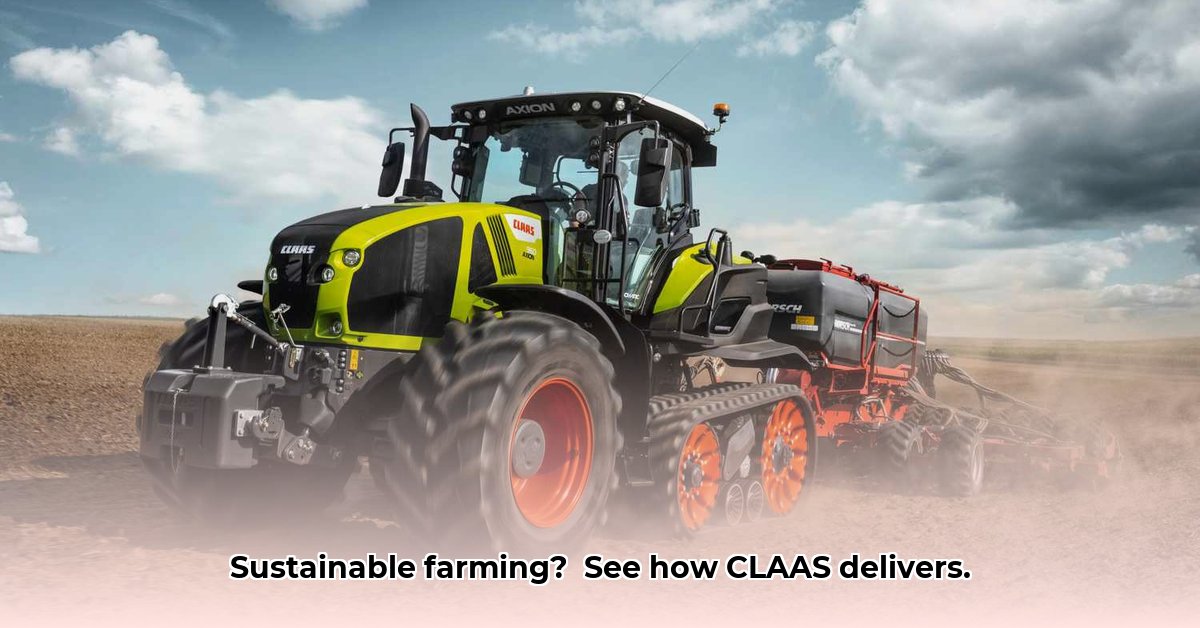
Farming today demands a delicate balance: feeding a growing global population while safeguarding the planet. This challenge necessitates innovative solutions, and CLAAS tractors are emerging as a key player in the drive towards sustainable agriculture. This article explores how CLAAS machinery is contributing to more efficient and environmentally responsible farming practices, examining real-world examples and outlining the potential for future advancements.
Fuel Efficiency: Minimizing Environmental Impact
One significant environmental concern in agriculture is fuel consumption. CLAAS tractors, through advanced engine technology and design, achieve remarkable fuel efficiency. While precise quantitative data comparing fuel savings against older models requires further research, anecdotal evidence from farmers highlights noticeable improvements. Reduced fuel usage translates to lower operating costs for farmers and, critically, a smaller carbon footprint, minimizing greenhouse gas emissions. This efficiency is not only economically advantageous but also environmentally responsible. How significant are the fuel savings actually, and what's the current research showing?
Precision Farming: Optimizing Resource Use
CLAAS tractors are frequently integrated with precision farming technologies. These systems leverage GPS guidance, sensors, and data analytics to optimize the application of inputs like fertilizers and pesticides. Imagine a tractor planting seeds with pinpoint accuracy, ensuring uniform spacing and preventing waste. This precision not only boosts crop yields but dramatically reduces the quantity of chemicals needed, minimizing environmental damage and maintaining soil health. What are the specific yield increases and reductions in chemical usage reported by farmers using CLAAS precision farming technologies?
Adaptability: Meeting Diverse Farming Needs
Sustainable farming demands adaptability to various environments and conditions. A technique successful in the arid landscapes of Texas might prove unsuitable for the wetter climates of Europe. CLAAS tractors demonstrate adaptability across diverse terrains and weather conditions. From the expansive fields of the American Midwest to the smaller farms of Europe, CLAAS machines have proven their effectiveness in different soil types and climates. This versatility is crucial for creating resilient farming systems capable of withstanding climate change challenges. Can you provide examples of CLAAS tractor models specifically designed for different soil types and climatic conditions?
The Potential of Sustainability: Bridging the Data Gap
While the potential benefits of CLAAS tractors for sustainable agriculture are evident, comprehensive data to fully quantify the environmental impact remain limited. Further research is crucial to measure the full lifecycle environmental impact, encompassing fuel consumption, greenhouse gas emissions throughout the machine's lifetime, and the long-term effects on soil health. While some studies exist, more comprehensive analysis is required to generate conclusive data. What specific research initiatives are underway to address these data gaps, and what are the expected timelines for the release of this information?
Future Outlook: Innovations on the Horizon
CLAAS demonstrates a clear commitment to sustainable agricultural practices. Industry experts anticipate further innovations in the coming years, including the exploration of electric or hybrid powertrains to minimize reliance on fossil fuels. Advanced implements are likely to further reduce soil disturbance, preventing erosion and promoting carbon sequestration. Improved integration with smart farming technologies will likely enable even more precise and efficient resource management. These advancements will make farming more sustainable and resilient while helping farmers adapt to evolving regulations and market demands. What specific technologies is CLAAS currently researching or developing to further enhance the sustainability of its machinery?
Actionable Insights: A Collaborative Path Forward
Achieving truly sustainable farming requires collaborative efforts among several key stakeholders:
1. Farmer Actions: Farmers should explore fuel-efficient practices and leverage precision farming technology to optimize resource use. Long-term investment in smart farming technologies and data-driven decision-making is crucial.
2. CLAAS Actions: CLAAS should conduct comprehensive lifecycle assessments (LCAs) of its tractors to rigorously quantify environmental impact. Further development and marketing of machinery specifically designed for minimal environmental impact is essential.
3. Research and NGO Actions: Independent research and NGOs should conduct studies on the environmental impact of farm technology, working to develop standardized metrics for evaluating agricultural machinery sustainability.
Mitigating Challenges: Proactive Strategies
Sustainable farming faces several challenges requiring proactive mitigation strategies:
- Fossil Fuel Reliance: Transition to renewable energy sources like biofuels or electric/hybrid powertrains.
- Soil Degradation: Promote reduced-tillage practices and use machinery designed for minimal soil disturbance.
- Greenhouse Gas Emissions: Optimize engine design for reduced emissions and explore alternative fuels.
- Supply Chain Disruptions: Diversify sourcing and enhance supply chain resilience.
CLAAS tractors represent a significant step toward a more sustainable future in agriculture. While comprehensive long-term data are still being gathered, the potential for positive environmental impact is substantial. The future of farming hinges on efficiency, resilience, and environmental stewardship, and CLAAS is actively contributing to this crucial vision.